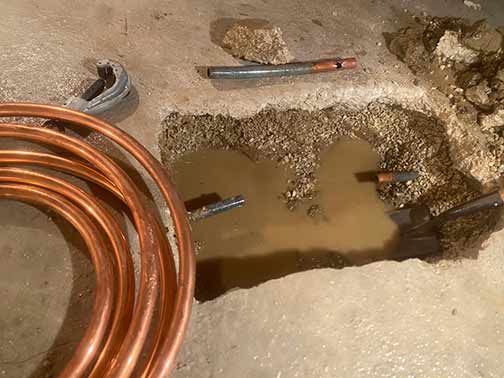
Water line repair and replacement is not a common plumbing issue in homes. It is possible to live in your home for decades without any problems with your main water line. However, KRS Holdings Richmond team notes that when these problems eventually happen, they must be addressed promptly and accurately.
Your main water line is the pipe that connects your entire plumbing system to the municipal water supply. It runs from the edge of your property to your house before branching out into smaller pipes that supply the plumbing fixtures and appliances inside the home.
Problems in the main water line can cause your home’s water supply to cease. Issues on the main water line can also lead to water contamination. If the water line is broken but the problem is unknown, the resulting leak can cause massive structural damage to your property.
How you fix a damaged water line is as important as detecting the problem on time. Because of its location underground, repairing a water line can be a complex process. If the issues are not understood and approached correctly, they can lead to even worse problems in your home.
When working to fix a main water line, what are the potential pitfalls you need to look out for? It is vital to be aware of these possible complications before embarking on the project. That knowledge could save you from wasting your time, energy, and money.
- Delayed action leads to higher costs
Prompt action prevents extensive damage and costly repairs. If your main water line is already badly damaged, this advice may be too late. However, it is good to know that most main water line issues can be prevented by inspecting and maintaining the line on a schedule instead of waiting until problems happen.
- Inadequate inspections and insufficient repairs
A common issue when fixing a damaged water line is misdiagnosis. The problems in the water line may be overdiagnosed, leading the homeowner to spend too much money. It can also be under-diagnosed, in which case the applied solution doesn’t work, and the repairs have to be done again. To avoid these problems, you need proper line inspection. A professional plumber will use specialized equipment – cameras and water leak detection tools – to assess the condition of the line.
- Replacing when you should repair
When the problems in a water line are correctly diagnosed, you can choose an effective solution. Typically, you have a choice between repairing and replacing the line, depending on the type of damage and how extensive it is. To ensure you are not wasting money on water line replacement when a simple repair will do, work with an experienced plumber with proven expertise in water line repair.
- No/insufficient soil conditions assessment
Soil conditions play a big role in the lifespan of a water line. If the repair method used to fix the line did not account for the prevailing soil conditions, the water line may fail prematurely. It is not uncommon for a water line to collapse a few years after being repaired. Proper soil assessment ensures the longevity of your water line and good soil drainage.
- Failure to adhere to regulations
To repair the damaged line, you need the proper permits. Additionally, repairs must be done following the specifications of existing regulations. Failing to obtain a permit or doing your project in violation of the established standards will cost you money and delay your project. That is one more reason why it is essential to use a licensed water line repair company with a lot of experience working within your locality.
- Outdated repair methods
The two main options when repairing a water line are traditional or trenchless. Traditional methods involve digging a trench to retrieve and replace the damaged pipes. Understandably, this takes time, is disruptive, and is very costly. Trenchless repair methods are less invasive and don’t take as much time or money. The proper technique for your particular water line problem will depend on the size of the damaged pipe section and the peculiarities of the location.
- Improper site restoration
After the water line is repaired or replaced, you should expect the excavation site to be restored to its original condition. That is not just about restoring the aesthetics of your landscaping. Failure to restore the site to its proper state may lead to future drainage issues on your property. If the soil is poorly compacted, it can predispose the location to soil erosion, weaken your building foundation, or even endanger the newly laid water line.
These pitfalls serve as a list of essential details to consider when talking to any water line repair company about issues in your home. Based on the company’s responses to questions about these common issues, you can decide if you should work with them or not.


